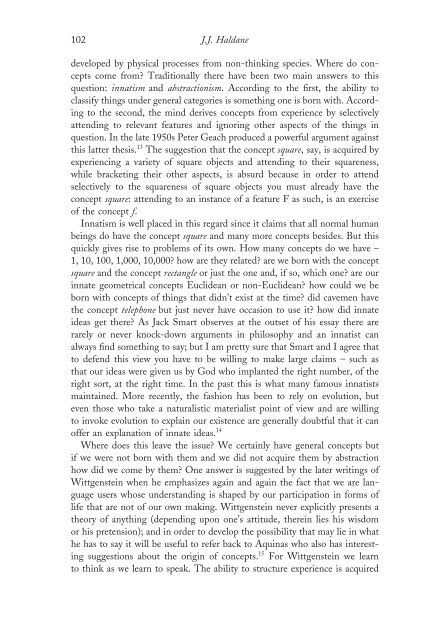Atheism and Theism JJ Haldane - Common Sense Atheism
Atheism and Theism JJ Haldane - Common Sense Atheism
Atheism and Theism JJ Haldane - Common Sense Atheism
Create successful ePaper yourself
Turn your PDF publications into a flip-book with our unique Google optimized e-Paper software.
102 J.J. <strong>Haldane</strong><br />
developed by physical processes from non-thinking species. Where do concepts<br />
come from? Traditionally there have been two main answers to this<br />
question: innatism <strong>and</strong> abstractionism. According to the first, the ability to<br />
classify things under general categories is something one is born with. According<br />
to the second, the mind derives concepts from experience by selectively<br />
attending to relevant features <strong>and</strong> ignoring other aspects of the things in<br />
question. In the late 1950s Peter Geach produced a powerful argument against<br />
this latter thesis. 13 The suggestion that the concept square, say, is acquired by<br />
experiencing a variety of square objects <strong>and</strong> attending to their squareness,<br />
while bracketing their other aspects, is absurd because in order to attend<br />
selectively to the squareness of square objects you must already have the<br />
concept square: attending to an instance of a feature F as such, is an exercise<br />
of the concept f.<br />
Innatism is well placed in this regard since it claims that all normal human<br />
beings do have the concept square <strong>and</strong> many more concepts besides. But this<br />
quickly gives rise to problems of its own. How many concepts do we have –<br />
1, 10, 100, 1,000, 10,000? how are they related? are we born with the concept<br />
square <strong>and</strong> the concept rectangle or just the one <strong>and</strong>, if so, which one? are our<br />
innate geometrical concepts Euclidean or non-Euclidean? how could we be<br />
born with concepts of things that didn’t exist at the time? did cavemen have<br />
the concept telephone but just never have occasion to use it? how did innate<br />
ideas get there? As Jack Smart observes at the outset of his essay there are<br />
rarely or never knock-down arguments in philosophy <strong>and</strong> an innatist can<br />
always find something to say; but I am pretty sure that Smart <strong>and</strong> I agree that<br />
to defend this view you have to be willing to make large claims – such as<br />
that our ideas were given us by God who implanted the right number, of the<br />
right sort, at the right time. In the past this is what many famous innatists<br />
maintained. More recently, the fashion has been to rely on evolution, but<br />
even those who take a naturalistic materialist point of view <strong>and</strong> are willing<br />
to invoke evolution to explain our existence are generally doubtful that it can<br />
offer an explanation of innate ideas. 14<br />
Where does this leave the issue? We certainly have general concepts but<br />
if we were not born with them <strong>and</strong> we did not acquire them by abstraction<br />
how did we come by them? One answer is suggested by the later writings of<br />
Wittgenstein when he emphasizes again <strong>and</strong> again the fact that we are language<br />
users whose underst<strong>and</strong>ing is shaped by our participation in forms of<br />
life that are not of our own making. Wittgenstein never explicitly presents a<br />
theory of anything (depending upon one’s attitude, therein lies his wisdom<br />
or his pretension); <strong>and</strong> in order to develop the possibility that may lie in what<br />
he has to say it will be useful to refer back to Aquinas who also has interesting<br />
suggestions about the origin of concepts. 15 For Wittgenstein we learn<br />
to think as we learn to speak. The ability to structure experience is acquired

















